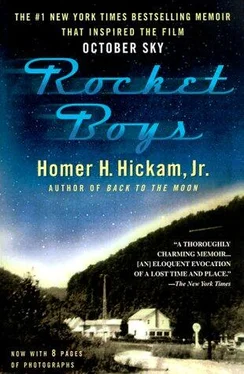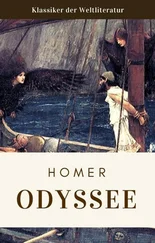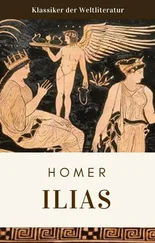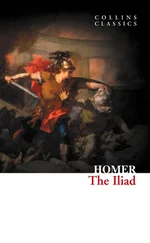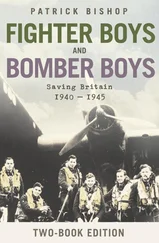“I told you, I told you, I told you,” Quentin kept saying to me over and over.
When things settled down, we got yet another award. An Air Force major stood and announced that we had earned a first-prize certificate for being “Outstanding in the Field of Propulsion.” He talked about our exhibit, saying it contained the most sophisticated rockets he’d seen this side of Cape Canaveral. “You got that right, Major!” O’Dell brayed.
After the presentations were over, the major came by to shake my hand. He said he hoped I’d consider the Air Force as a career. I had the other boys come over, and when I introduced them, he beamed and said, “The United States Air Force would love to have each and every one of you.” He had apparently not noticed Sherman’s shriveled leg or Quentin’s doubtful slouch.
It was raining as we drove home through the twisting valleys and the coal-smeared towns of Mercer and McDowell counties, the mines alongside the road so quiet and empty they looked as if they’d been abandoned for a thousand years. A bus passed us. HUBERT HUMPHREY FOR PRESIDENT was emblazoned on its side. It sent back a dirty spray that splashed across the windshield. Roy Lee eased up on the accelerator a bit. A few miles farther down the road, the bus that had passed us with such alarm had stopped. Somebody was out of it, waving his hat at a tiny gathering. I was feeling sick to my stomach again and my head felt like it was splitting. Roy Lee stopped to let me go throw up, and when I came back from the ditch, the other boys had climbed up on a stone wall. Hubert Humphrey was a rotund little man, whose jaw and arms seemed to be connected by a string. The more he waved his arms, the faster his mouth seemed to move. He was on a tear, promising the crowd if he got to be president, the government was going to come in and set everything right, even run things if it had to. No one would ever go hungry if he was president, no sirree, and nobody would lack for a job either.
“Let’s ask him a question about space,” Sherman suggested, and he waved his hand at him, but Humphrey never looked his way. He was still talking when Roy Lee guided his car past the bus and then sped up, slowing only to make his way through the little town of Keystone, the streets empty except for a mangy dog picking around the front of an abandoned store.
MR. Turner called me to his office the following Monday to shake my hand. “You’ve surpassed all my expectations, my boy,” he said. “I’m going to call an assembly. We’re going to give you a proper send-off to Indianapolis.”
During the assembly, all the members of the BCMA got to stand up and take a bow. Mr. Turner called me up front. “I’ll do my best to represent Big Creek,” I said, frowning into the stage lights and trying to ignore my splitting head. I was still having bouts of nausea and now headaches.
Miss Riley stood and said, “This just goes to show that Big Creek students can do just about anything they want to do. I know Sonny is going to make us even more proud in Indianapolis.”
Seeing Miss Riley so positive and hopeful made me ashamed and disgusted with my symptoms. I was just being a weak sister.
That night I was drawn to my backyard by some undefinable need. All was quiet there in the dark, save the rustling of the leaves in the apple tree, barely stirred by a gentle wind. I walked deep into the yard beyond the light from the kitchen window and stood very still, scarcely breathing, wondering why I was there, hoping something inside me would give me the answer. The night air was so clear that when I looked up, the stars seemed to form a glowing blue-white bridge that arched from mountain to mountain. I stood enthralled, letting my mind wander happily down the starry trail until my attention was drawn to the fence where I was surprised to see someone standing there looking my way. As dark as it was, I recognized him just by the way he tilted his head. “Roy Lee?” I called. “What are you doing there?”
“I was looking out my window and saw you come out into the yard,” he said. “I’ve been meaning to talk to you, but I wanted it to be kind of private-like, you know? Guess this old backyard is as private as it gets in Coalwood.”
I waited while Roy Lee leaned on the fence and had a bout of general fidgeting, clearing his throat, squinting, running his hand through his hair, and so forth. Whatever he had to say, he didn’t much want to say it. “Roy Lee, what?” I finally demanded.
“I found out what happened to her.” He nodded toward the apple tree and I realized he was talking about Daisy Mae. “I found out who killed her like I promised you I would.”
I came over to the fence. “Who was it?” I hissed, ready to commit murder. “Pooky, right?”
“No. But it was one of those blamed idiots who follows him around. Pooky most likely put him up to it.”
As mad as I was at Pooky, I surprised myself by thinking first of Calvin. Calvin had been mean to me his whole life but I had come to see him in a different light since he had helped me by finding my rocket stuff. Still, if Pooky had sentenced Daisy Mae to die, I couldn’t forgive him, even for Calvin’s sake. “I have to do something, Roy Lee,” I said. “I can’t let him get away with this.”
“You don’t have to do anything, Sonny,” Roy Lee said. “Pooky’s left town. The way I heard it, Calvin tried to keep Pooky from beating up his ma and got smacked pretty hard. The neighbors called Tag and Tag came right up, kicked in the door, and threw Pooky in the creek. Tag told him if he ever saw Pooky’s face in Coalwood again, next time he’d throw him down the mine shaft. Pooky couldn’t get away fast enough, Tag was that mad.”
“What about Calvin and his mother?”
“The widow Clowers up in Six took them in until Calvin graduates and goes into the Army.”
“And what about the man who ran over Daisy Mae?” I asked.
Roy Lee twitched some more, turning finally to look up at the dark mountains. The lights from the gas station burnished his sleek black hairdo. “I’d tell you his name, Sonny, if you made me, but the way I heard it, he’s real sorry now he did it. You want to know?”
I considered it and then shook my head. What good would it do for me to go around sharing the same town with someone I hated? I just didn’t see the sense of it. Anyway, I figured the man who killed Daisy Mae would eventually get his due without any help from me. Justice, after all, had finally come to Pooky—Coalwood justice. It seemed as if the town had a way of eventually settling everything if only one was patient enough to let things sort themselves out.
“Thank you for telling me, Roy Lee,” I said, and all of a sudden I realized how much he meant to me. I found myself wanting to say that I hoped Roy Lee would always be my friend, and that I could be his, no matter what happened to us or where we went or how far apart we were. I settled for hitting him on the shoulder and then letting him hit me back, a good balled fist to the shoulder that hurt. That said everything I wanted to say without letting the words get in the way of it, anyway,
I said good night to Roy Lee and moved away from the fence and walked to the apple tree, wanting to be near Daisy Mae. I knelt and patted her grave, taking a handful of soil from it. I would put it in a fruit jar and take it to Indianapolis with me. Standing, I took a deep breath of mountain air, and then I knew something else. Mr. Dubonnet had been right that day years ago by the old railroad track when he said I had been born in the mountains and that’s where I belonged, no matter what I did or where I went. I didn’t understand him then, but now I did. Coalwood, its people, and the mountains were a part of me and I was a part of them and always would be. I also remembered that night when Dad had come back from Cleveland and we had argued in my room. I had gone to my window after he’d left and looked out, envying the men I saw going to and from the mine, because they knew exactly who they were and what they were doing. Standing under the apple tree where Daisy Mae was buried, I realized I didn’t have to envy them anymore: I also knew now who I was and what I was going to do. That was when, almost as if someone had pulled a string, my stomach and head stopped hurting.
Читать дальше
Конец ознакомительного отрывка
Купить книгу
